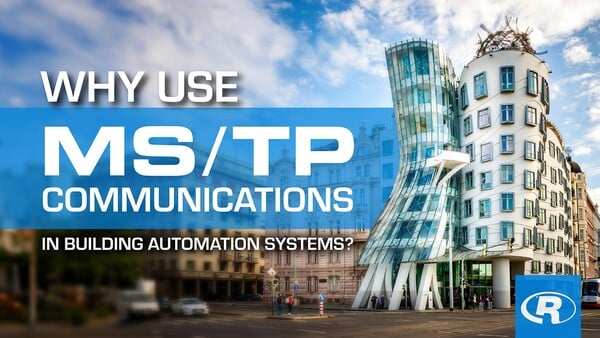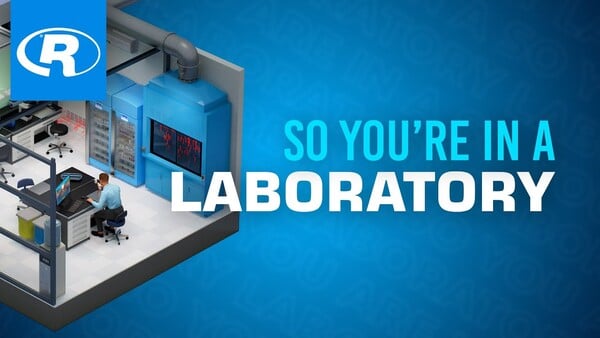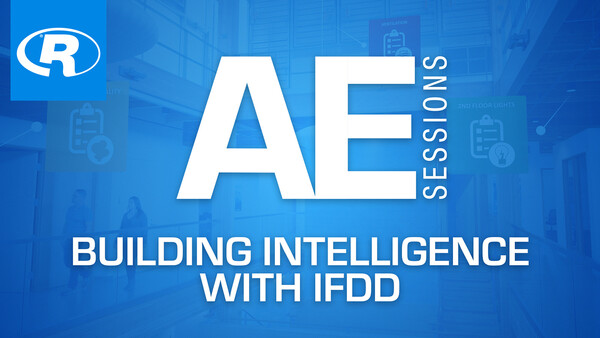How building automation impacts health, efficiency, and indoor air quality in hospitals
How does building automation ensure hospitals are safe, secure, comfortable environments for everyone?





When opportunities are plentiful, the economy is strong, organizations are freely spending, and plenty of work exists for everyone, a disciplined sales culture might seem unnecessary. However, when the marketplace grows more competitive, the economy slows, money becomes scarce, and more solution providers are in competition for fewer opportunities, every advantage, no matter how small, makes a significant difference to sustainable success. Some advantages are intrinsic, natural. Most advantages, though, are no accident; they are the result of preparation and hard work. In a challenging economic climate, the words of American football player and coach Paul “Bear” Bryant regarding preparation become particularly insightful. In sports, business, and life, the individuals and organizations that consistently win are most likely those who put in the consistent preparation to win. In times of plenty and times of want, the more lucrative business opportunities almost certainly go to those who are proactive influencers and creators rather than passive consumers in their marketplace.
A focused sales culture breeds advantage. Advantages accumulate from consistently executing actions that are predictive of success. A carefully cultivated sales culture synchronizes the entire organization to consistently do the small things that create advantages. One of the traits that distinguishes effective sales cultures is a persistent, proactive cadence. Proactive refers to action taken before, in anticipation of, and in preparation for an event, foreseen or unforeseen. By contrast, reactive action is taken after, and in response to, an event that has already happened.
In application, a business with a reactive sales culture responds to marketplace demand and opportunity. Being responsive is important to minimizing perception gap, but being significantly or even exclusively reactive is playing in the arena devoted to competition. It is difficult to be heard or to stand out. By contrast, a proactive sales culture inspires demand and creates opportunity. When complemented with empathy, a business with a proactive sales culture creates market space by identifying compelling ways to benefit their consumers before they are asked—perhaps even before their clients realize their circumstances can be improved. This is an important and valuable consideration. If an empathetic, proactive sales professional internalizes the responsibilities, perceptions, needs, and wants of people and organizations in their marketplace, they can identify a beneficial solution before the problem is even fully appreciated.
An accountable browser user interface (BUI) to an operational technology (OT) system is one example of just such a benefit with a broad range of impact that may not yet be fully appreciated. A business with a proactive sales culture can leverage this benefit to create advantage and influence the marketplace. A business with a reactive sales culture would choose to do nothing until the demand has already been defined and the marketplace parameters have been established by peers.
We discussed the role of OT system accountability in caring for the health and welfare of people and property in the built environment in the last three installments of this insight series. The benefits are powerfully compelling to many modern organizations. OT systems directly affect the physical world and should provide reasonable accountability for fiscal and natural resource consumption, reputation, and especially human health and safety.
Even minor built environment system inefficiencies over time result in significant costs. An accountable facility automation system helps organizations understand how and why their resources are being expended and their facilities are being operated.
Brand reputations can take generations to establish but be tarnished almost immediately by a breach of confidential information, manipulation of operational data, or the unavailability of critical systems. An accountable facility automation system allows organizations to monitor and maintain their reputation and operational efficacy by providing an accurate understanding of who is operating the system and how.
Improper operation of large equipment can pose a safety risk to operators and occupants. The health and welfare of people who inhabit the built environment is directly influenced, positively and negatively, by the performance of the mechanical/electrical processes and the automation systems responsible for their monitoring and control. An accountable facility automation system provides assurance that changes to processes are made responsibly and that logs are accurate, maintaining a safe operating environment.
A BUI to an OT system allows occupants, operators, and executives to easily interact with their built environment. More than facility automation or building management, empowering facility executives to manage their mechanical and electrical systems with accountability introduces valuable business automation. RC-WebView® facilitates this engagement with accountability and brings answers to those who must justify actions, decisions, or outcomes.
In some heavily regulated industries, built environment professionals and facility executives have accountability that exceeds their people and property to encompass legislation and regulation. The dominant example of such regulation with worldwide influence is Title 21 CFR Part 11. As detailed in the May 2020 installment of insight, this validation standard prescribes that electronic data in regulated industry processes meet the same legal requirements as paper records.
Title 21 CFR Part 11 has significant implications for the pharmaceutical, medical device, biologic, biotech, contract research, and other regulated industries. In early 2020 it was easy to identify more than 5,800 organizations that must directly verify compliance with this regulation and an additional 8,700+ significantly regulated organizations in the United States alone.1 Compliance for these organizations is a commercial imperative. Significant costs and negative impacts are associated with nonconformance, including lost revenue, penalties, lawsuits, destruction of product, refusal to test, and breach of contract.
RC-WebView2 is purpose built to be a component of a Title 21 CFR Part 11–validated system for FDA-regulated processes and indoor environmental monitoring and control. The intrinsic features of RC-WebView described in the April 2020 installment of insight make it appropriate for operation in validated environments.
Accountability in a BUI is not limited to facilities regulated by Title 21 CFR Part 11. Many Reliable Controls Authorized Dealers are experiencing growing success in agricultural technology, particularly indoor and vertical farming. Electronic data and information for these emerging segments are not yet fully regulated by legislation like Title 21. It is reasonable to expect that as technology plays an increasing role in indoor food production, and as the industry develops, legislation will follow.
RC-WebView is already on the cutting edge of sustainable solutions for the agriculture market. With RC-WebView in their built technology portfolio, organizations have an opportunity to be prepared for when legislation is inevitably introduced. The accountability of RC-WebView will help agtech organizations feel confident about the future and set up for success.
Facilities with critical environment requirements are not exclusive to the food and drug marketplace. Curators, conservators, and archivists are acutely aware of the irreparable damage that can be wrought on artifacts, documents, and works of art by poor control of the indoor environment. Data center administrators face a risk of mission disruption if mechanical systems cannot maintain an appropriate operating environment.
Surgical suites and operating rooms have critical requirements for temperature, humidity, and air quality. An accountable OT supported by RC-WebView can be crucial to helping these specialists maintain their environments.
The marketplace is a dynamic environment. Change is the only constant. Consumers and their needs change. Businesses and how they make decisions change. The composition and quantity of alternative solutions change. The products and services provided by peers and competitors change. Anyone can succeed occasionally. Only by improvising, adapting to, and overcoming the constant fluidity of the marketplace can we be truly in control of our success. Complacency, inaction, and simply trudging along places our success in the hands of others. It leaves us holding the leftovers.
Paul “Bear” Bryant knew a thing or two about winning. During his 25-year tenure as the head coach of the University of Alabama football team, he amassed six national and 13 conference championships. At his retirement, Bear Bryant held the record for the most wins as a head coach in more than a century of collegiate football. His words still ring true: “It’s not the will to win that matters, everyone has the will to win. It’s the will to prepare that matters.” Winning requires consistent effort.
The term reactive describes acting in response to a situation rather than creating or controlling it. By contrast, a proactive person, policy, or action creates or controls a situation by causing something to happen. An empathetic consumer experience and business agility require being responsive. However, if a business’s sales culture is based solely on reacting to organic opportunities in the marketplace or consumer inquiries, it is difficult for them to be in control of their success. A business with a proactive sales culture takes positive action to create and control enduring success.
Success is an instantaneous measurement of accomplishment. It is seldom sustained by accident. Sustainable success requires preparation, hard work, and continuous improvement. Focusing our best efforts on activities that are predictive of success today is one proven way to take control of our success tomorrow.
RC-WebView—and the easy accountability it provides—is a powerful tool for existing and future customers. Integrating this accountability in a BUI elevates the facility automation experience and confidence for food and drug manufacturers, laboratories, universities, and financial and government institutions. The list goes on. Almost any modern built environment can benefit from the elevated enterprise accountability delivered by RC-WebView.
It is easy to externalize and focus on the reasons we cannot succeed, the obstacles in our path, alternatives to our solutions, and peers competing for the same opportunities. It is easy to play in a marketplace and according to the rules laid down by others. Although preparation and proactive sales require hard work, they form the path to creating our own sustainable success. Success is not an exclusive purview of the powerful. Proper preparation and effective execution of simple actions that are predictive of success are force multipliers. Be proactive and seize the OT opportunities available in the accountable BUI of RC-WebView.
1 Organizations by sector in the United States: 384 pharmaceutical (pharmapproach.com/list-of-pharmaceutical-companies-in-united-states-of-america/1); 3,929 medical device (crunchbase.com/hub/united-states-medical-device-companies#section-overview); 449 biotech (statista.com/statistics/197930/number-of-united-states-biotech-companies-by-type); 377 biologic (with 579 outside of the United States for a total of 956) (biopharmguy.com/links/company-by-location-biologics.php); and 750 contract research organizations (nbscience.com/list-of-contract-research-organizations-cros).
2 RC-WebView 3.13 or later.

How does building automation ensure hospitals are safe, secure, comfortable environments for everyone?

Learn when and why MS/TP communication is helpful in building automation systems.

From the moment you park your car at a hockey arena, your comfort and safety are enhanced through a building automation system. Here’s how.

Building automation systems can make buildings truly intelligent, reducing their carbon footprint and saving money. Learn how.

Ever wonder how a building automation system ensures safety and accuracy in lab work?

Museums—and their building automation systems—play an important role in preserving the preserved. Learn how.

When you see a doctor or personal trainer, you benefit from their knowledge and experience. In the same way, a building automation system should provide all the tools you need to maintain your buildings in optimal health.

What are you doing to mitigate the transmission of viruses indoors? Learn what measures you can take and how your smart building provides more information and control for IAQ concerns.